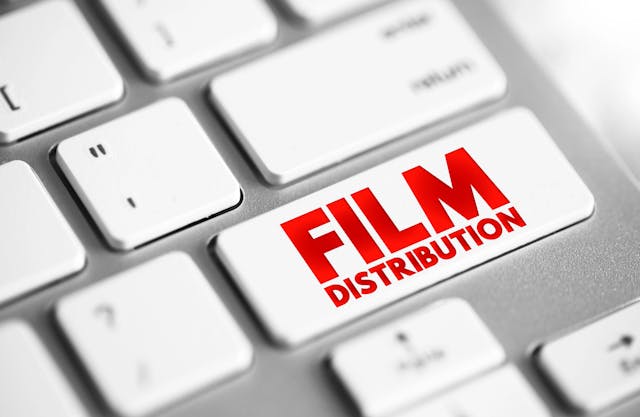The Deal is In: Which Film Distribution Deal is Best for You?

Get your film distribution deals here, folks!: filmmakers, agents & distributors mill around the European Film Market at the Berlinale. / Photo by ©Cineberg Ug, courtesy of Dreamstime.com
Welcome to the beautiful world of film distribution, where your masterpiece will hit the realities of the film market. You might feel like you are signing your life away, with your shaky hand holding a pen over the piece of paper that will pretty much decide the luck of your movie. It sounds like a nightmare, but it does not have to be that awful! You will get peace of mind if you know what the options are. That knowledge will help you navigate different offers and settle for the one that best serves your project. No matter where you are in the production process, here’s a primer on the kinds of distribution deals you might find coming across the table. Spoiler alert: some might even come before a script is written!
This is not an exact science, so the categories are somewhat porous. Two or more kinds of agreement can exist over the same movie. Confused? Don’t be. We’ll do our best to help you figure out which way is up - and down. Sign away with peace of mind. You’ll love to see it!
Co-Production: International or Domestic
A co-production supposes two or more companies share the costs of a project and the ownership of the finished project. This cooperation may happen before the cameras roll. Depending on the size and scope of the companies, they may have distribution operations already running, so the future of the movie is somewhat predictable. When two international companies - that is, companies from different countries - decide to partner up, they can take advantage of any subsidies granted by their governments or cultural institutions. In some cases, you might need to shoot in their territory or engage local talent in front and/or behind the camera. Check out the final credits and stay until the end. It might surprise you to see which countries gang together to make movies happen. Case in point: Nikolaj Arcel’s “The Promised Land,” our favorite 2023 foreign film not nominated for an Oscar. It was submitted by Denmark, but resources also came from Sweden, Norway, and Germany.

Scandinavia Assemble!: Denmark, Sweden, and Norway ponied up the dough to make "The Promised Land," with a little help from Germany. / Photo by Henrik Ohsten, courtesy of Magnolia Pictures
First-Look Deals
If your debut indie movie rocks the Cannes Film Festival, chances are the company that buys the distribution rights will offer you a First Look deal to sweeten the pot. It means that they get first dibs when you come up with your sophomore effort. It’s a win-win situation. You go away with somebody already interested in supporting the project or gain traction to sell it to someone else if the First-Looker were to pass. Yes, that is a possibility. That’s the “first look” part. They have the preferential spot in the line of companies eager to throw money at you. Fret not. If the “pass,” you a usually free to take it elsewhere. And in the movie business, there is no such thing as sloppy seconds. One company’s trash is another one’s treasure.
License
This is a somewhat porous term, encompassing permission to distribute your movie within certain parameters and for a determined length of time. It can be exclusive to a single company of shared within territories and distribution methods. For example, you can license theatrical rights to one company and home video rights to another. The first one may run for two years, the second for five. The best part is that you retain ownership of your movie, and once the license runs its course, distribution rights revert to the owners - that is, you -. You can sell them again if you want to and if you have any takers. Word to the wise: when somebody offers you a license agreement, read the fine print to make sure you are not licensing the movie “in perpetuity.” Unless the money is good enough to give your baby away for good.
Negative Pickup
Don’t think this kind of agreement implies a pan on your movie! The “negative” to which it refers is basically the final cut of the movie, printed in “negative” film. See what they did there? The Negative Pickup implies that a company agrees to buy the finished product in exchange for some or all the distribution licenses. The upside is that you have complete creative control over the movie. The downside is that, usually, the big company does not give you money upfront. In that case, you have to find resources elsewhere. Filmmakers usually take out loans from banks and financial institutions that foot the bill for such endeavors. Because the big distribution company usually gets all rights in perpetuity, it’s pretty much impossible to sell partial licenses to other players.
As you can imagine, it’s very difficult - not to say impossible - for a newbie to get one of these juicy contracts. Negative pickups are just for well-established directors and producers who already have a relationship with big studios.

Sophia Ellis in the Mouth of Madness: Foreign horror finds negative pickup deals in US film festivals, like Aussie "Talk to Me," bought by A24 off Sundance. / Photo courtesy of A24.
Output Agreement
We can get it for you wholesale! The Output Agreement is usually signed by a production company and a distributor and covers several projects not yet developed. It’s a “package deal,” fit for directors with a proven record. Imagine going to shoot, knowing that more than one of your future projects already has financial backing and guaranteed distribution! One can only dream…
PDF Agreement
No, it’s not the popular document format designed by Adobe. The acronym stands for “Production, Finance, Distribution Agreement.” Think of this as the contract a mob boss extends to a gun for hire - I’m not saying that studio honchos are gangsters, mind you. This is just for illustrative purposes. So, in this kind of agreement you and/or your company are basically a free agent engaged to perform a job. The big company foots the bill, so you don’t have to go out on a limb, hustling for money. The other side of that coin is that their ownership of the final product is pretty much pre-determined. And your artistic control may be null. It’s their baby, all the way.
Pre-Sale
Another sweet deal for established talents. A pre-sale is usually offered by a company in exchange for a license circumscribed to a certain territory over a limited amount of time. There’s money upfront for you before the cameras even roll. Once they open the movie in the territory designated, you may get a cut of the box-office sales, depending on how it plays when it comes to bringing audiences to the theater or moving home video units if it's a direct-to-video deal. Or streams. Geez, we do have too many outlets for movies, am I right?
Then again, even if you are a proven talent, it might be very difficult to get a pre-sale agreement. Case in point: Francis Ford Coppola, the man behind “The Godfather” (1972), "The Conversation" (1974), and “Apocalypse Now” (1979) shopped around his dream project, “Megalopolis.” No big studio is committed to it. Good ol’Francis sold his winery business to foot the production bill, taking all the risk himself. "Megalopolis" will premiere at the Cannes Film Festival, where it’s competing for the Palme d'Or. It's ripe for a Negative Pickup! Godspeed, Francis!

Distributors' Delight: Francis Ford Coppola footed the bill for "Megalopolis" and is now looking for a distro deal. / Photo by ©Eldar Nurkovic, courtesy of Dreamstime.
Rent-A-System
No, it’s not that old store that used to lease TVs and VCR players. It’s the kind of deal that gives you, the filmmaker, the power over the distributor. Basically, you go with your finished product to a company you want to work with and negotiate how much money they want to handle distribution of your movie. Usually, you agree on a percentage of revenue to cover expenses and provide a nifty profit for them. The good thing about this model is that the balance of power is tilted in your favor. The bad part is that you don’t get funding for production from them. Also known as Rent-A-Distributor. What’s stopping us from calling them “Private Distributors”? They distribute for money, and any old movie will do. Damn, that Tina Turner sure could produce earworms…
Sales Agent
This is not a “deal” per se, but a person. The sales agent agrees to represent your movie in the wild, wild world of film distribution in exchange for a fee. Together, you decide how far his control goes, whether it’s, say, limited to theatrical, home video, or to a particular territory. He can be exclusive too and handle all the distribution deals possible, which turns him into a defacto agent for the movie. However, you keep the rights to the movie. It’s possible that you grant distribution rights to a particular company in the United States and get an international agent to search for deals in Europe, Asia, or Africa.
These are just some of the distribution agreements that get cooked in film markets and executive suites all over the world. Again, this is not an exhaustive list, but it covers the most common variants. Any form it takes, be sure to lawyer up, and read the fine print. This is valid whether you are dealing with big studios or indie distribution companies. Remember, you and your movie deserve the best distribution deal possible.
Watch “Lonely”
“Lonely” is a powerful reminder that no one is ever truly alone, and there is always someone out there who cares and wants to help.
Stream NowWant to get an email when we publish new content?
Subscribe today




























